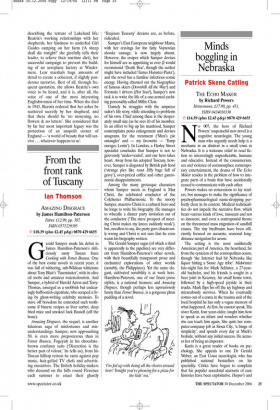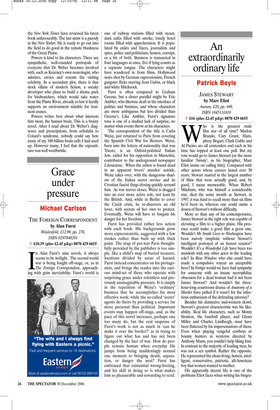Minds boggling in Nebraska
Patrick Skene Catling
THE ECHO MAKER by Richard Powers Heinemann, £17.99, pp. 451, ISBN 0434016330 ✆ £14.39 (plus £2.45 p&p) 0870 429 6655 No 007, the hero of Richard Powers’ suspenseful new novel is a cognitive neurologist. The young man who urgently needs help is a mechanic in an abattoir in a small town in Nebraska. It is a welcome relief to read fiction so interestingly unpredictable, humane and educative. Instead of the consumerism, sex and violence of commonplace contemporary entertainment, the drama of The Echo Maker resides in the problem of how to integrate parts of a brain that have accidentally ceased to communicate with each other.
Powers makes no concessions to lay readers, but manages to make the significance of psychopharmacological name-dropping perfectly clear in its context. Medical technicalities do not impede the narrative flow, which bears various kinds of love, innocent and not so innocent, and even a contrapuntal theme on the threatened mass migration of sandhill cranes. The tiny birdbrains have been efficiently focused on accurate, seasonal longdistance navigation for aeons.
The setting is the most undilutedly American part of America, the heartland, far from the cynicism of the cosmopolitan coasts, though ‘the Internet had hit Nebraska like liquor hitting a Stone Age tribe’. Midwinter late-night fun for Mark Schluter, a 27-yearold bachelor, and his friends is sought in a beer joint in Kearney, his small home town, followed by a high-speed joyride in their trucks. Mark flips his off the icy highway and miraculously survives. When he eventually comes out of a coma in the trauma unit of the local hospital he has only a vague memory of what happened. At first, he cannot speak. His sister Karin, four years older, taught him how to speak as an infant and wonders whether she can teach him again. She quits her computer-company job in Sioux City, ‘a binge of simplicity’, and spends every day at Mark’s bedside, without any initial success. He accuses her of being an impostor.
Karin is a great reader of books on psychology. She appeals to one Dr Gerald Weber, an East Coast neurologist, who has published national bestsellers on his speciality. Critics have begun to complain that his popular anecdotal accounts of case histories have been exploitative. Harper’s and the New York Times have reviewed his latest book unfavourably. The last straw is a parody in the New Yorker. He is ready to go out into the field to do good in the remote blankness of the Great Plains.
Powers is kind to his characters. There are sympathetic, well-rounded portrayals of everyone that Dr Weber becomes involved with, such as Kearney’s own neurologist, who admires, envies and resents the visiting celebrity. In a secondary plot, there is that stock villain of modern fiction, a sneaky developer who plans to build a theme park for birdwatchers, which would take water from the Platte River, already so low it hardly supports an environment suitable for transient cranes.
Powers writes best about what interests him most, the human brain. This is a brainy novel. After I read about Dr Weber’s diagnoses and prescriptions, from echolalia to Cotard’s syndrome, nobody could say how many of my 100 billion brain cells I had used up. However many, I feel that the expenditure was well worthwhile.





































 Previous page
Previous page